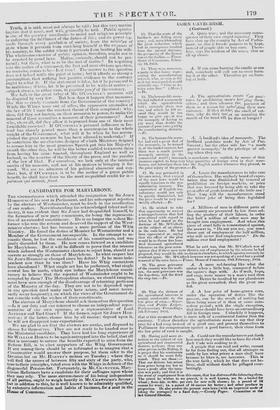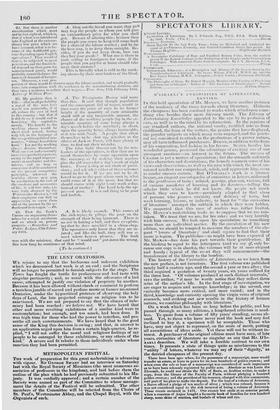CORN CATECillSAL
landlords are falling every year ; and, notwithstanding
the great reduction which
had iu consequence resulted
from the annual decrease, the prosperity of the firmer was oo the duel; ue.— Times.
irl• That the rents of the
Ilouse of Commons, Febru- ary 19, 18:.34. ( antenna& )
bare shut up the country by Act of Parlia- ment, so that it breeds paupers to be kept,. instead of people able to buy corn. There- all up closer.
quence of their own stupid injustice. They fore, says the wisdom of the acres, shut us A. Quite true ; and the necessary conse- 14. There was, moreover, a party in that house repre• senting the manufaeturing interest, who, as soon as the malt tax was repealed, would naturally say, " Give its fo- reign corn free." (Hear. ) —lb.
15. The honourable mem- ber had talked of a monopoly which the agriculturists Itch! ; certainly there was one, and which he felt as- sured they would be too happy to give up—it was the monopoly of having to pay more than double the amount of poor- rates paid by the manufacturing districts.
16. The honourable mein- A. landlord's idea of monopoly. The her bad said a great deal of landlord prohibits trade by Act of Par- tite monopoly, as he termed liament ; but the other side has "a much- it, of the laMled interest, but there was a much greater monopoly," in the privilege of scl- • • - gnatei- monopoly mg when they can. . existing in the commercial world ; inasmuch as merchants were enabled, by means of their immense capital, to keep very latge quantities of fiweign corn in their ware- houses, and Introduce them into the English market whenever they pleased, to
the great injury of the grower.—R.
terially affected.—lb. exportation of English ma- the price would be very ma- equally injurious to the ma- his own mind, that a repeal of the corn laws would be nufacturing interest. The nufactures would not only be greatly diminished, but 17. He was persuaded in great offer of goods instead of the little one? the bitter joke of being thus legislated for? prohibition on foreign markets, or price that was lowered by being able to take the tation that was diminished by removal of how long will the manufacturers stand of themselves. Has anybody beard of expor- A. Leave the manufacturers to take care A. Millions of men in different parts of 18. He wished to take that opportunity to correct the country are prevented by law from sel- a misapprehension that had ling the produce of their labour, in order gone abroad with regard to that half a million of other well may be what he bad stated as the brought into employment. And when this doctrine of Mr. APCulloch piece of cruel folly is remonstrated against, on the subject of an altera- the answer is, "Do not you see, you must in the corn laws. He had throw out of employment the half million, been represented as saying who will never find employment." Do the that the effect of the plan millions ever find employment?
would be to throw five hun- dred thousand agricultural
labourers on the poor-rates. What he said was, that Mr. M‘Culloch was of opinion that if these men were thrown out of employment by the scheme he had proposed, they would be able to obtain it elsewhere, to which opinion certainly he could not agree. Mr. APCulloch however was not speaking of a total but a partial removal of the corn laws.— Times. House of Commons, 16th February, 11334.
19. The great grievance of the country was the malt- tax, the next grievance was the hop-duty, and the third the soap- tax.— lb. A. A mere red-herring like what the orator when a little boy, scampered before the squire's dogs with. As if malt, hops, and soap, were nearer to a man's soul than corn. Better be insulted by our plunderers as the great unwashed, than the great un- fed.
20. That the distress of A. A low price of home-grown corn, the agricultural interests is under the operation of duties like the mainly attributable to the present, can be the result of nothing but low price of corn.— Guar- there being more of it than at some ante- d:a". ""d Pah' Legge' cedent period ; with the single exception, arhamentary Proceedings, that there should have been an extraordinary 5th February NW. fall in foreign corn. Unluckily it happens, that at this moment there is more talk of a continental famine than the contrary. Unless therefore the agriculturists mean to say that they pray for a bad crop instead of a good one, and present themselves to Parliament for compensation against a good harvest, their claim from the low price of corn is naught.
last General Election.
ounces for wool ; Is. a pound of 16 ounces for butter ; and other produce in proportion. He also prefers the present corn laws (with as improved mode of taking the averages) to a fixed duty.— County Paper. Committee at the wheat ; from 52s. to 60s. per cwt. for new milk cheese; Is. a pound of 16 from prices being too low to
leave a profit after the taxa- tion was paid ; and that it is
the want of employment from this cause, that has distressed the labouring class. on it should be more fully stated. They are these:—
other person in the Riding, It
The prices he wishes to see prevail, it is well known, are Sit. a bushel for agricultural and commercial
distress, perhaps, than any
is proper that his sentiments
That our distress has arisen
tention to the subject of oar
21. Having paid more at-
lieve, shall without doubt be pillaged ever- be far front finding out, that all attempts to the true faith ; which he that does not be- settle by law what prices a man shall have because lie likes it, are larcenies. This is lastingly. how much they would like to have for cloth ? Jack Cade was nothing to it. A. Could not the manufacturers put forth A people that can read and write, cannot A. If you cease burning the candle at one end, somebody will call out to cease burn- ing it at the other. Therefore go on burn- ing at both.
A. The agriculturists create t'„e pooe-, rates by prohibiting men's kee`iring them. selves ; and then advance the payment of - them as a reason for upho',ding their own nuisance. If they dislike, the smell of car.- riot!, why do they ins;.st on muzzling the mouth of the beast tilk he dies of hunger ? 22. But there is another coasideration which must not be lost sight of, which is, that if wheat was introduced into England at the extraor- dinary low price which we have assmned, what is to be- come of the 6,4100,(K)) per- sons depending upon English agriculture? [hey would of cour-e be subjected to great pi iva dons, and the diminish- ed demand on their parts 14 manufactured goods, would probably counterbalance the increased demand of foreign- ers. Moreover, a vast pro- portion of them would be thrown upon the labour-market, and would gradually enter into competition with the workmen in the manufacturing districts, and thus have a tendency to reduce their wages.— True SIM, 17th February 1834. Later ;Villiam Pare. A. The Westminster Reeiew said more than this. It said that though population and the consequent fall of wages, would in time carry the price of corn to its former height it the quantity of corn attainable stood still at any imaginable amount, the chance of the working people lay in the at- tainable quantity of corn being always a day's march before the mischief; in short, upon the quantity being always increasable, as it was with Noah. A people that allow themselves to be shut up, whether at the advice of Jack or Peter, -vill have plenty of time to find out their mistake.
The Use light thrown out by the mis- h miffs of the operatives, is that they are to mend themselves by some operation upon the currency, or by making their masters give the old wages for it day's work of eight hours. Faney a ship at sea short of provi- sions ; and ask what either of these schemes would do for it. If we are not to be al- lowed to go to the port where corn is, what could comm., of it at the most, but that we should starve with eight hours work a-day, instead of twelve ? The Lord help the op- pressed poor. It is a sad thing to be poor and foolish.
A. It is likely enough. This comes of the rich trying to pillage the poor on the strength of their being ignorant. There is no use in baiting a bull, and then co.nplain- ing that he does mischief in a china-shop. The opendives only know that they are in- jured ; and like the bull, they will run a- muck where heaven pleases. The fault was with the minister, that said he " would trot" put down the wrong. See how long he continues of that mind.
(To be continued.)
A. Shut out the bread you want, that yOM may keep the people to whom you will give an extraordinary price for what you shall get. Beware of altering this; because then the people you cease to keep will come back for a share of the labour market ; and by far the best way, is to keep them outright. Be- sides, if you do not keep them, how can they buy your goods ? What use is there in your selling to foreigners for corn, if the people that you pay for at home should take away their custom ?
This is literally what is told to the work- ing classes by their own leaders of the blind.
20. My position then is this :—that in all probability a repeal of the corn laws would not materially, if at all, reduce the cost of food in this country : but that if it did do so, it would end in bens titiiig the capitalists merely. The benefit to the working classes would be short lived indeed, lasting oaly till, in the language of the competitive political eco- nomists, " things found their level." Let not the working classes deceive themselves. With our vast and constantly incrersi rig prod net ive powers, owing ro the rapid improve- ments in, mechanics and che- mistry, and so long as commerce shall be conducted on the present competitive principles, whatever the working cla,ses may gain by a reduetion in the cost of the comforts and necessaries of life, it will last only, (as very truly observed by the ld'esbitinster Review)," till their employers can find an opportunity to screw theta out of the amount by the re- duction of their wages. "—lb.
• 24. That the Trade's Unions are organizing them- selves thr a social revolution and an attack on private property. —Guard/um awl Public Ledyer,17th Febru- ary 18t41.





















 Previous page
Previous page